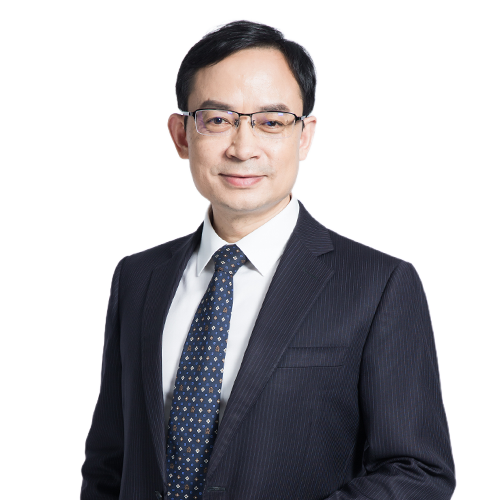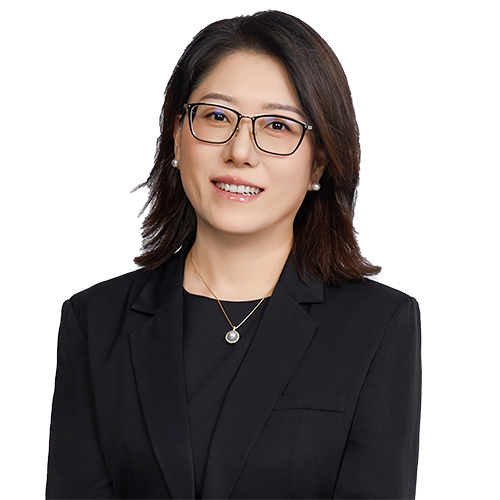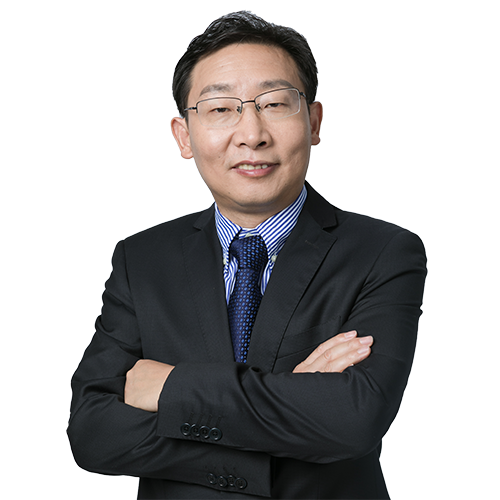On the afternoon of June 26th, 2025, the 5th session of “Criminal Defense Talks” hosted by Criminal Department II was successfully held in King&Capital Law Firm. The activity was addressed by Zhu Yonghui, Director of King&Capital Law Firm, and was respectively delivered by Liu Pinxin, Professor of School of Law of Renmin University of China, Doctoral Supervisor, Adjunct Professor of State Prosecutor's College, Adjunct Professor of Wenlan of Zhongnan University of Economics and Law, and Dr. Deng Changzhi, Senior Engineer of Institute of Software of Chinese Academy of Sciences, Specialist of Funds Analysis of the Ministry of Public Security, Doctor of Computer Application. Mr. Deng Changzhi gave the lecture; Mr. Xia Jun, Mr. Zang Desheng, Mr. Nie Sufang and Mr. Wang Zaikui, senior partners of King&Capital Law Firm, and Mr. Zhang Pengpeng, Director of Business Management Department, moderated the lecture.
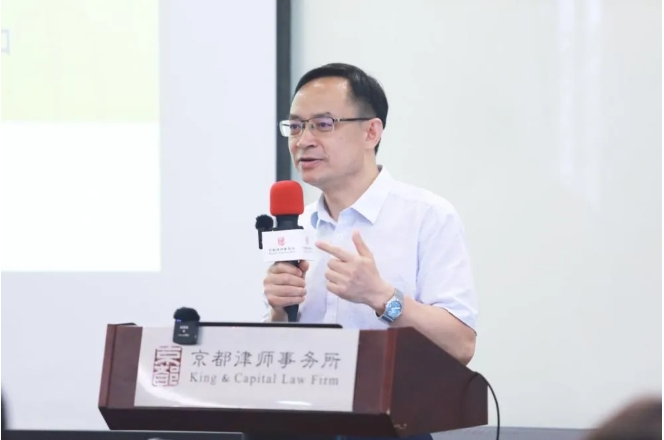
On behalf of King&Capital Law Firm, Mr. Zhu Yonghui firstly expressed his heartfelt thanks to Mr. Liu Pinxin, Mr. Deng Changzhi and other guests for their great support, and warmly welcomed colleagues and friends from all walks of life to participate in the activity of “Criminal Defense Talks of Hundred People”. He emphasized that King&Capital Law Firm, since its foundation by Mr. Tian in 1995, has always been cultivating the industry with the positioning of “academy school” law firm, and has maintained a high degree of sensitivity and attention to the learning of new laws. This event focuses on effective criminal defense in the context of the Private Economy Promotion Law, which is an important seminar in line with the development trend of the rule of law. When talking about the new law study, Zhu Yonghui put forward the depth of the “three layers of learning theory”: the first layer is to grasp the specific provisions of the law, clear the state in the private economy to protect the level of system design, which is the basis for learning; the second layer is to explore the principles behind the legislation, to learn from professors, understand the background and intention of the law, which is the key to the application of the law. The second level is to deeply explore the principles behind the legislation, learn from professors, and understand the background and intention of the law, which is the key to applying the law; the third level is to use the comprehensive ability to interpret the law reasonably and legally, so as to make it serve the defense of the case effectively, which is the ultimate goal of learning. He believes that only through these three levels of progressive learning can the essence of the new law be truly integrated into the practice of criminal defense. Coinciding with the 30th anniversary of the founding of King&Capital, Mr. Zhu Yonghui, director of the firm, extended a sincere invitation to the industry, hoping that more lawyers would pay attention to King&Capital and support its activities, and looking forward to the elites in the industry joining King&Capital to work together for the development of the law and contribute to the construction of the rule of law.
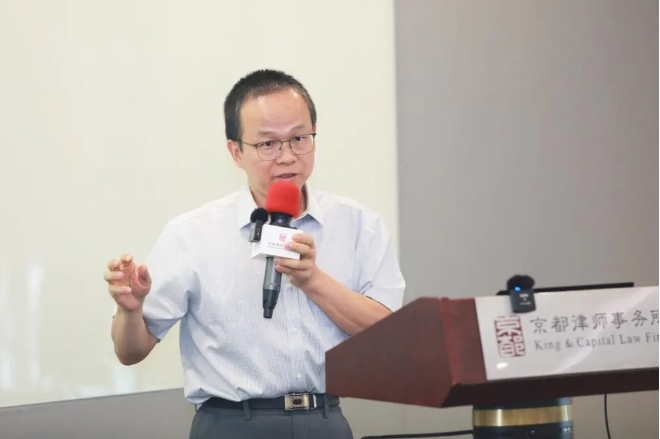
Prof. Liu Pinxin took the implementation of the Private Economy Promotion Law as an entry point, and combined with his own practical experience in handling cases of online gaming companies in Guangdong and other places, he profoundly revealed the complexity of profit-oriented justice. He pointed out that although the law has made special provisions for the protection of the private economy, the phenomenon of profit-oriented law enforcement, such as “inter-provincial pelagic fishing”, still exists in a more covert way. In the screening of the tendency to justice, Professor Liu Pinxin summarized a series of characteristics: the case is mostly companies and other economic subjects as the object, the objective evidence is mainly electronic evidence and mostly formed before the filing of the case or the end of the investigation, often by a company or its funding of the appraisal agency to participate in the whole process of the evidence service, the jurisdiction of the unit to handle the case is doubtful and the level of investigation is low, and so on. For such cases, Liu Pinxin put forward the electronic evidence as the core of the six-step screening method, including judging the elements of electronic evidence, the authenticity of key evidence, the authenticity of the report, the formation of evidence time, whether the police intervene in advance and whether the outsiders are illegally involved in the investigation. He emphasized that the defense of electronic evidence is a new type of defense form integrating big data thinking, which needs to penetrate the fog of profit-oriented justice and realize effective defense by restoring the process of appraisal and investigation, denying the prosecution's alleged facts, and putting forward positive claims affecting the conviction and sentencing, etc. He also used actual cases to illustrate that the defense of electronic evidence can be achieved through the use of practical cases. He also used actual cases to illustrate that restoring the law enforcement scene through electronic data and discovering the existence of corporate counterfeiting issues can be a defense path to overturn an improper verdict.
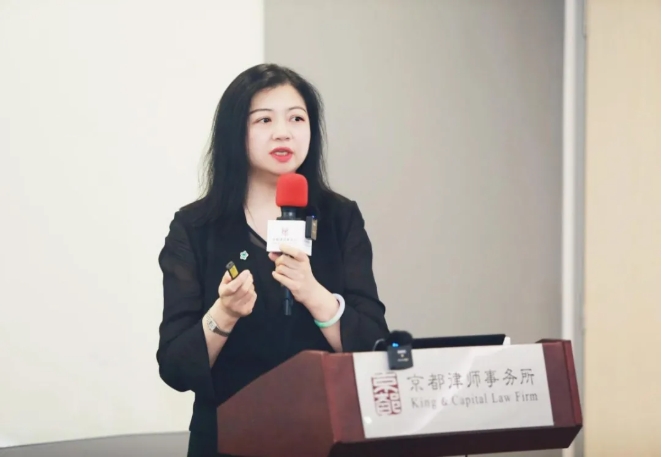
With “empowerment and breakthrough” as the center, Ms. Xia Jun systematically elaborated the effective defense path for the protection of property rights of private enterprises and private entrepreneurs. She pointed out that in recent years, the state has issued a series of policies and regulations for the protection of the legitimate rights and interests of private enterprises, private entrepreneurs continue to bring good news, May 20, 2025 the implementation of the “Private Economy Promotion Law”, in the legal system for the development of the private economy to escort, but also for the lawyers in the defense of cases involving criminal lawyers in the private sector to be able to work. In the defense of the breakthrough path, Xia Jun lawyers put forward four core strategies: first, lawyers should pay attention to the property involved in the case as early as possible, as early as possible to analyze, counseling clients to collect evidence of property belonging to the property involved in the case of the property has been taken in a timely manner to put forward the defense of the property involved in the mandatory measures, to avoid improper disposal of property due to the enterprise into business difficulties; second, pay close attention to the “three distinctions Secondly, we pay great attention to the principle of “three distinctions” (distinction between proceeds of crime, other property and legal property, property of private economic organizations and personal property of private economic organization operators, property of the person involved in the case and the property of outsiders) and the principle of “four exceeds” (exceeding the authority, exceeding the scope, exceeding the amount, exceeding the statute of limitations), and we accurately identify the property in the handling of the case. Third, after the relevant property has been seized and frozen, every effort is made to strive for the possibility of continued reasonable use, i.e., without affecting the investigative activities, to safeguard the enterprises involved in the case, as the main body of the property rights involved in the case and the main body of the market economy, the right to reasonable use of the relevant property, and to alleviate the impact of the investigation on their lawful production and operation. Fourth, active defense to promote the lawful and proper disposal of the property involved in the case. She said, on the one hand, lawyers should pay attention to the scope of the seizure and freezing of property, the amount of legitimacy and reasonableness, for legitimate property to put forward effective evidence, pointing out that not the proceeds of the law, other property or outsiders' property; On the other hand, but also for the property involved in the subsequent custody, appraisal, appraisal, auction, sale of norms, fairness and openness and so on, to carry out a full defense. In addition, Mr. Xia Jun also combined with the implementation of the new supervision law, proposed that lawyers can be before and after the investigation of the supervisory organs, for private enterprises, private entrepreneurs to provide from the legal risk prevention to the protection of personal rights, property rights and other full range of legal help, and effectively safeguard the legitimate rights and interests of private enterprises.
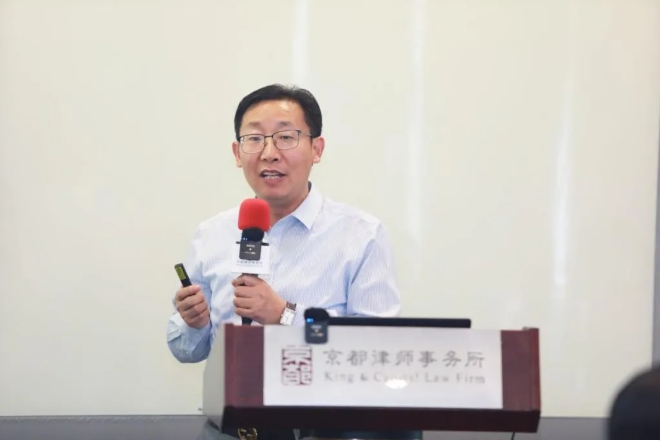
Lawyer Zang Desheng focuses on the specific application of the Private Economy Promotion Law in criminal defense, and carries out in-depth analysis from three dimensions. On the issue of retroactivity, he pointed out that Article 45 of the law clearly stipulates that the relevant documents shall not be retroactive, which is the same as the principle of criminal law “from the old and from the light”, the Supreme Court also stated that we should look at the irregularities in the operation of private enterprises from the perspective of history and development, and acquit those with insufficient basis for conviction according to the law, which is a good opportunity for the lawyers to deal with the “original” of the private enterprises in the defense. This provides an important legal basis for lawyers to deal with the issue of “original sin” of private enterprises in their defense. Regarding the use of coercive measures, Mr. Zang Desheng emphasized that the dependence of private enterprises on the controller is extremely strong, and once detention measures are taken, it is very easy to lead to the collapse of the enterprise. Therefore, based on the Law on Promotion of Private Economy and related regulations, lawyers should make efforts in the whole process from the change of coercive measures, review of custodial necessity to the suggestion of sentencing, and strive for non-custodial coercive measures and non-custodial sentences, so as to minimize the impact on the normal operation of the enterprise. In particular, he pointed out that non-custodial measures such as release on bail pending trial are crucial for private enterprises, which can effectively avoid paralyzing the enterprise due to the arrest of the operator. In the defense of criminal bribery cases, Mr. Zang Desheng combined with the requirements of the law on the regulation of official-business relations, and pointed out that there is a tendency for the element of “seeking benefits” to be deflated in the current judicial practice, and that lawyers should distinguish between the different levels of normal performance of duties, seeking legitimate benefits, seeking undue benefits, and seeking unlawful benefits in the defense. These factors affect the determination of crimes and misdemeanors as well as sentencing, and the nature of behavior should be accurately defined in the handling of the case, so as to avoid incorrectly identifying normal political and business interactions as transfer of benefits.
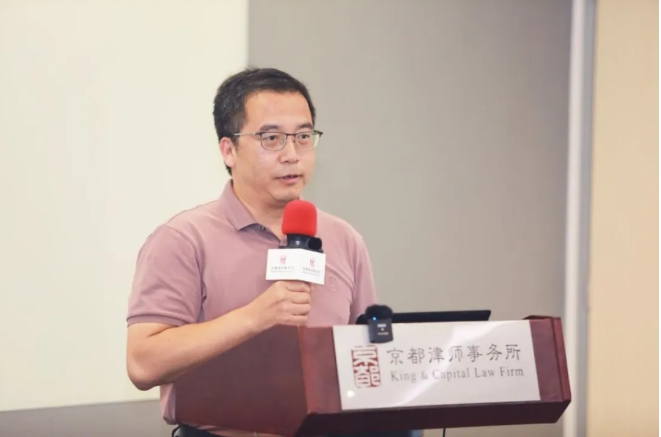
Mr. Deng Changzhi, an expert in the field, took the core concept of “gold analysis as evidence” and systematically sorted out the strategy of reviewing and examining the electronic evidence of funds in enterprise-related cases. He introduced that “Golden Analysis as Evidence” is the legal practice of transforming the results of fund analysis into evidence in criminal proceedings, and its development has gone through four stages: from the review of paper bills around 2012, to the construction of a platform for the investigation and control of illegal and criminal funds in 2015, to the application of the electronic evidence system of funds in 2018, and to the standardization of the work of fund analysis and appraisal nowadays. The standardization of appraisal work. With regard to the specialization of fund analysis and identification, he pointed out that it covers multiple dimensions such as the integrity of the electronic data of funds, the professionalism of flow tracking, the determination of the nature of funds, the analysis of transaction patterns, and the correlation between the fund chain and the criminal organization. In terms of evidence review, firstly, we should pay attention to the legitimacy and completeness of the data source, and discover problems such as missing and duplicated bank transactions through checking rules; secondly, we should carry out a flow-through review, pay attention to the contradiction between algorithmic probabilistic and identification certainty, and avoid erroneous identification due to technical limitations; at the same time, we should formulate a targeted review in conjunction with the characteristics of different crimes, such as fraudulent value-added tax invoicing and job misappropriation, etc. The main points. In terms of cross-examination strategy, expert Deng Changzhi proposed to start from the legitimacy of identification procedure, data authenticity and completeness, and rationality of identification methods and conclusions, focusing on the reliability of algorithm and identification tools, the probative power of probabilistic conclusions, and the evidentiary support for the determination of the nature of the funds, and revealing the possible problems in the identification report of fund analysis through multi-dimensional cross-examination.
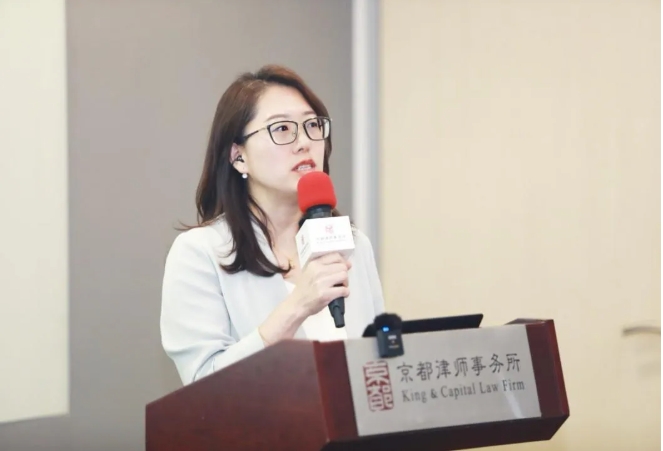
Nie Sufang took the determination of unit will in enterprise-related crimes as the core, combined with her own experience in handling cases, and launched an in-depth discussion. She pointed out that the core of the determination of unit crime lies in the unit will, unit behavior and unit interests of the three elements, of which the determination of the unit will is the most complex and controversial, the relevant norms will be divided into the unit will by the unit collective research and decision, the specific right to the natural person decision, the right to the natural person knowingly acquiesced and through the objective behavior of the backward deduction of the situation. However, in the enterprise corporate governance structure is increasingly perfect, Nie Sufang lawyers emphasize, can not simply the specific natural person's will is equivalent to the unit will. She proposed that the determination of unit will should be comprehensive consideration of the size of the company, the larger the scale, the wider the interest groups involved, the more prudent determination; attention to the nature of the company, the family business and the equity structure of the company should be treated differently; review of the articles of association of the company, the management system and the past decision-making process, if the behavior does not follow the established decision-making procedures, need to be careful to determine the will of the unit. In the context of private economic protection, Nie Sufang called on defense lawyers to maintain a prudent attitude in the determination of unit liability, fully consider the survival and development of the enterprise, and question the practice of easily upgrading the will of a natural person to the will of a unit, to avoid the enterprise being held criminally liable due to the behavior of an individual person, and to effectively safeguard the lawful rights and interests of private enterprises.
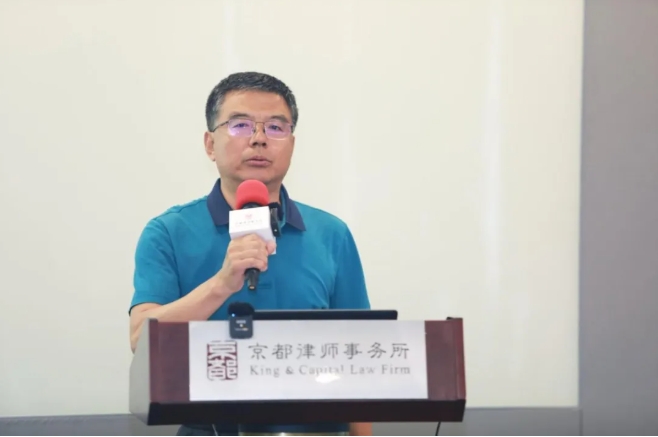 Mr. Wang Zaikui put forward four key thoughts on the protection of private economy from the level of criminal justice concept. In response to the issue of original sin of private enterprises, he pointed out that China's private enterprises in the early stage of reform and opening up the development environment, the system is not yet sound, if the current law to censure the historical behavior, it is unfair. He suggested that the “original sin” behavior many years ago, under the premise of not violating the basic principles of the law, can not be pursued, to avoid the high cost of judicial activities on the business operation of a devastating blow to the crime of misrepresentation of registered capital, for example, with the change of the system, the behavior of the past should be held in a tolerant attitude. In terms of the use of coercive measures, Mr. Wang Zaikui advocates balancing judicial efficiency and business protection. For private business operators, in the current difficulty of evidence fixation, can learn from advanced experience, the use of electronic monitoring and other non-custodial measures, not only to ensure the smooth progress of the proceedings, but also to maintain the normal operation of the enterprise. In terms of property preservation, over-scope and over-seizure and seizure should be avoided, and flexible methods such as limit seizure can be adopted to reduce the impact on the enterprise's financial chain while safeguarding the judicial purpose. Regarding the regulation of property sentence and free sentence, Mr. Wang Zaikui put forward an innovative viewpoint. He believes that, within the legal framework, according to the ability of private entrepreneurs to pay, more property sentences, less free sentences, such as high-income earners to increase the amount of fines, and correspondingly shorten the period of free sentences, so as to achieve the purpose of the penalty, but also allow entrepreneurs to continue to run the business, create tax revenue and employment, to achieve a win-win situation. On the incrimination standard, Mr. Wang Zaikui emphasized that for cases that can be incriminated but not incriminated, administrative punishment should be applied as a priority, so as to avoid excessive intervention of criminal punishment. He quoted Yellin's point of view that “punishment is like a double-edged sword” to warn of the harm of the abuse of punishment, and advocated upholding the principle of moderation in judicial practice to maximize the protection of the vitality of private economic development.
Mr. Wang Zaikui put forward four key thoughts on the protection of private economy from the level of criminal justice concept. In response to the issue of original sin of private enterprises, he pointed out that China's private enterprises in the early stage of reform and opening up the development environment, the system is not yet sound, if the current law to censure the historical behavior, it is unfair. He suggested that the “original sin” behavior many years ago, under the premise of not violating the basic principles of the law, can not be pursued, to avoid the high cost of judicial activities on the business operation of a devastating blow to the crime of misrepresentation of registered capital, for example, with the change of the system, the behavior of the past should be held in a tolerant attitude. In terms of the use of coercive measures, Mr. Wang Zaikui advocates balancing judicial efficiency and business protection. For private business operators, in the current difficulty of evidence fixation, can learn from advanced experience, the use of electronic monitoring and other non-custodial measures, not only to ensure the smooth progress of the proceedings, but also to maintain the normal operation of the enterprise. In terms of property preservation, over-scope and over-seizure and seizure should be avoided, and flexible methods such as limit seizure can be adopted to reduce the impact on the enterprise's financial chain while safeguarding the judicial purpose. Regarding the regulation of property sentence and free sentence, Mr. Wang Zaikui put forward an innovative viewpoint. He believes that, within the legal framework, according to the ability of private entrepreneurs to pay, more property sentences, less free sentences, such as high-income earners to increase the amount of fines, and correspondingly shorten the period of free sentences, so as to achieve the purpose of the penalty, but also allow entrepreneurs to continue to run the business, create tax revenue and employment, to achieve a win-win situation. On the incrimination standard, Mr. Wang Zaikui emphasized that for cases that can be incriminated but not incriminated, administrative punishment should be applied as a priority, so as to avoid excessive intervention of criminal punishment. He quoted Yellin's point of view that “punishment is like a double-edged sword” to warn of the harm of the abuse of punishment, and advocated upholding the principle of moderation in judicial practice to maximize the protection of the vitality of private economic development.
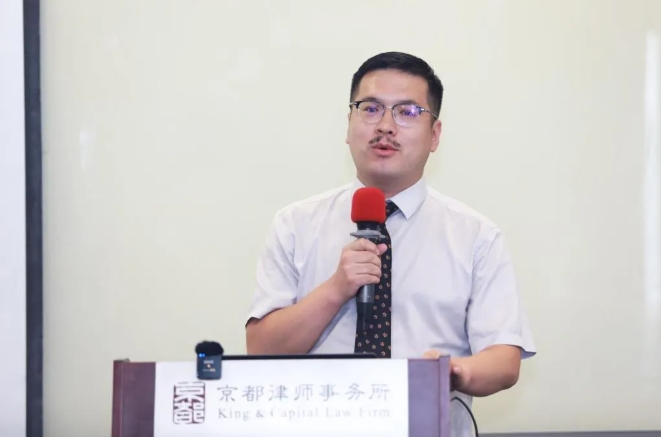
The host, Zhang Pengpeng, expressed his empathy for the topics discussed by the guests and his deep appreciation for the difficulty of comprehensive consideration in criminal defense, as well as his heartfelt thanks to the audience and the more than 3,000 netizens online for their continuous attention and active participation.
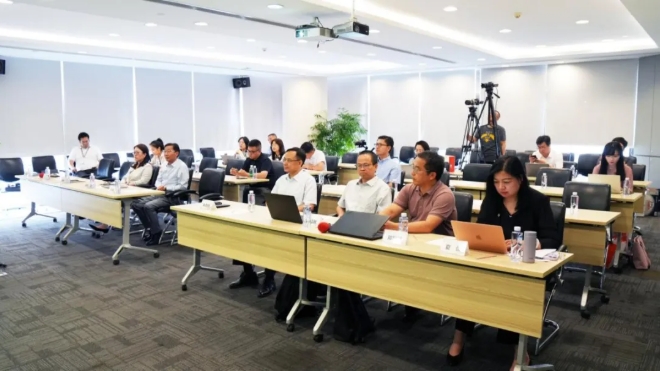
The fifth issue of “Criminal Defense Talk” centered on the effective criminal defense in the context of “Private Economy Promotion Law”. The guests shared their practical experience and defense strategies from the dimensions of judicial screening for profit-making, protection of property rights of private enterprises, determination of unit responsibility, review of electronic evidence of funds, etc., which provided a wealth of ideas for the protection of the rights and interests of private enterprises, and the seminar was successfully concluded with warm exchanges.



